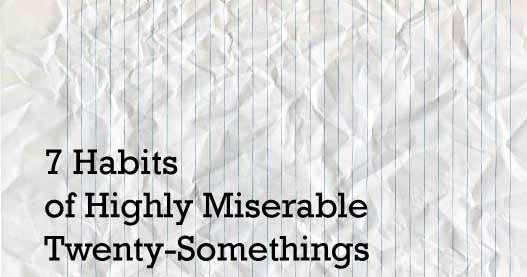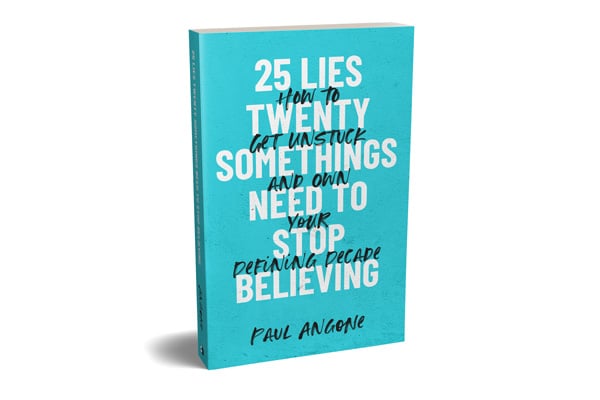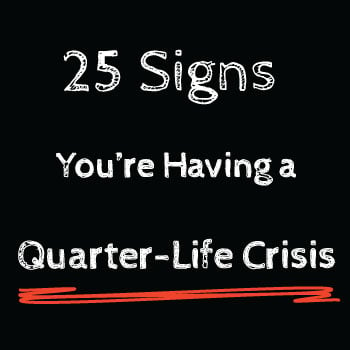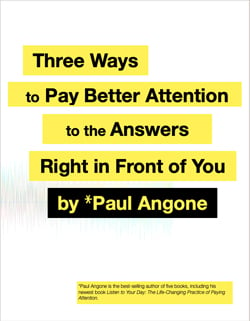“Happiness, like unhappiness, is a proactive choice.” —Stephen R. Covey
In my early twenties I could’ve been nominated for Miserable Twenty-Something of the Year.
Really, I had a stellar campaign going. I was bitter. Frustrated. Angry at God, man, and myself. My twenties weren’t turning out to be the success-fest like I’d planned and somebody, everybody was to blame. But it didn’t take long to realize that being miserable all the time, funny enough, is a freaking miserable way to live.
Now at 29 years old, after years of studying, writing, and researching, here’s what I believe are the seven habits of highly miserable twenty-somethings, and then how we cure each one.
7 Habits of Highly Miserable Twenty-Somethings
1. Complainism
It seems that complaining, with a heavy dose of cynicism, has become our national pastime. It only takes three minutes on Facebook, Twitter, talk radio, or the news stations to know that if you’re not complaining about something, you’re a bit of an outsider.
We complain about our crappy jobs, the slow Wi-Fi, our leaders in the office and around the world, and the waiter who brought only one basket of bread—the whole night! Jerk.
Complainism has become signature to our society—as culturally cool as deep v-necks and neon sunglasses. However, I learned that the road to miserable is paved with complainers and cynics.
The Cure? For me it was one question: What if I replaced moments where I had the right to complain and I created something instead?
It’s a simple thought, but I realized that complaining was giving the problem power over me like letting a sumo wrestler sit on me while I was still trying to run a race. The act of creating threw the sumo wrestler off and let me run my race. Complaining is passive and powerless. Creating is proactive and powerful.
2. Obsessive Comparison Disorder
Obsessive Comparison Disorder is the new OCD I’ve coined to describe an epidemic that’s plaguing our generation. It’s our compulsion to constantly compare ourselves with others, producing unwanted thoughts and feelings that drive us into depression, consumption, anxiety, and all-around joyous discontent. It’s a habit from Hades itself.
This new-found OCD encourages us to stay up late on Facebook pouring through all 348 pictures of our frenemies “My Life is Better Than Yours” album. Like having to run outside to light up a cigarette, our comparison-addiction is uncontrollable and killing us.
The Cure? Begin to recognize the signs leading up to an OCD attack. Late at night when you’re tired, do you feel your OCD begin to take over if you jump on Facebook? Do you notice that every time you watch your “favorite” show you feel bummed out about your own life because it’s not sitcom worthy? Just like you might curb the calories and quit binge drinking, maybe it’s time cut the things that consistently lead to Obsessive Comparison Disorder.
3. Lone Rangers
Too many of us are trying to Lone Ranger our twenties — forging our own path, biting the bullet, picking ourselves up by the bootstraps whenever we get bucked off, and every other Western cliché we can grab by the horns. (ha. See what I did there?).
Do you know what I hear the most from struggling twenty-somethings? – God, I feel so alone.
Making and keeping friends in our 20’s can feel harder than Chuck Norris’s abs. But that doesn’t mean we should ride off into the sunset without them.
One of the greatest lies we can believe is that we’re all alone on this journey. We’re not. We just need to get better at seeing and reaching out to those riding next to us.
The Cure? Vulnerability. Letting people inside all the doors and walls we put up to protect our stuff. Give them a call. Open up the door. Let people in. Really talk.
4. Krizzaaazy Timeline
Our plans and dreams aren’t the problem. Our timeline is.
I thought the red carpet was going to be rolled out on Day 23 of life after college when really it was penciled in for Day 2,334. You know, for when I was actually ready to walk down it.
Trying to control the timing of your plans coming to fruition is like a seven year old trying to walk a rhinoceros—impossible with a high chance of being trampled.
The Cure? Let go. Give your dreams the time and space to do their thing. Then watch your dreams grow bigger and stronger, as you feed it with creativity, consistency, and time. And when the time is right, I swear that dream will grow bigger, better, and more beautiful than you could’ve ever imagined. Very few people are uber-successful in their twenties, and if they are, what did they sacrifice along the way to make it happen?
5. Waiting for Someone to Show Us How
In the working world, very rarely is someone waiting there to teach you. We’re not paying them any longer. They’re paying us.
For too many years in my I kept waiting for someone to show me how. I didn’t realize they expected me to show myself.
The Cure? When you’re new to an office or career you have an amazing super power—you can see problems and solutions that those who have been there for an extended period are blinded to. Obviously, that also means it might take some finesse and common sense to begin tackling problems that no one thinks exists. But instead of pointing out the problem, begin experimenting with creative ways to find a solution. Don’t wait for them to show you how, go ahead and show them without them even realizing it.
6. Failing at Failure
Too many twenty-somethings are miserable because we’ve confused setbacks for settling. That just because we moved back in with our parents or took that job answering phones, that we’re failures. Failing does not make you a failure.
The Cure? Realizing that the only real failure of our twenties would be if we never had any. Failure is simply finding a more profound way to be successful, if we’re willing to learn from it, and then have the courage to possibly fail again. And possibly more profoundly than before.
The biggest risk we can take in our twenties is not taking any at all. We can’t let failure be our death sentence, instead of just one more sentence on the page before we turn it to the next.
7. Comfortable with Crappy
This is the scariest habit of them all. Yes for many of us crappy jobs, relationships, and setbacks are a twenty-something rite of passage. Too many people become comfortable with crappy. The job you used to hate, becoming the job you love to hate, and then the job you would hate to leave.
The Cure? Do not become content with living crappily ever after. You have a purpose inside you worth pursuing. Don’t let crappy become quicksand. Learn, grow, and then go.
Dispensing of Dirty Habits
Let’s locate these habits lying around our place and then throw them in the trash like the dirty diapers they are (sorry, the metaphor of a new dad). Let’s dispense these miserable habits before they smell up our entire decade.
We’d love to hear from you in the comments: How do you cure one of the habits above?
Are there other habits twenty-somethings need to dispense?








0 Comments